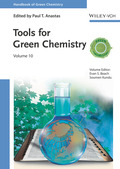Handbook of Green Chemistry - Tools for Green Chemistry
Handbook of Green Chemistry (Band Nr. 10)

1. Auflage Juni 2017
308 Seiten, Hardcover
91 Abbildungen (28 Farbabbildungen)
18 Tabellen
Handbuch/Nachschlagewerk
Kurzbeschreibung
Band 10 aus der Reihe Handbook of Green Chemistry unterstützt Chemiker bei der Erreichung ihrer Ziele im Bereich Grüne Chemie, präsentiert wichtige Tools, Datenbanken und Laboransätze wie Prognose-Software, Ökobilanz-Verfahren und Screening.
Volume 10 in the Handbook of Green Chemistry series provides useful and practical tools, databases, and laboratory approaches to support chemists working in both academia and industry in achieving their green chemistry goals. Among many other helpful techniques covered, the authors offer prediction software, life cycle assessment methodology, and screening tools.
- Finechem: Short-cut Models for Impact Assessment
- Models to Estimate Fate, Exposure, and Effects of Chemicals
- Collaborative Approaches to Advance Chemical Safety
- Introduction to Green Analytical Chemistry
- COSMO-RS Assisted Solvent Screening for Green Extraction of Natural Products
- Supramolecular Catalysis as a Tool for Green Chemistry
- Inverse Molecular Design Theory in Tight-Binding Frameworks and Its Applications
- Green Chemistry Molecular Recognition Processes for a Wide Variety of Metal Separations
- Shaping the Future of Additive Manufacturing: Twelve Themes from Bioinspired Design and Green Chemistry
- Rapid Screening of Reaction Pathway Alternatives
- The IFF Green Chemistry Assessment Tool
Soumen Kundu obtained his Bachelor of Science and Master of Science degrees in chemistry at the University of Calcutta and the Indian Institute of Technology at Kanpur, respectively. He received his PhD in Inorganic Chemistry at Carnegie Mellon University in 2012 under the supervision of Professor Terrence J. Collins, during which he worked on the development and application of Fe-TAML (Tetra Amido Macrocyclic Ligand) catalysts for the remediation of organic pollutants in water. After completing his graduate studies, Dr. Kundu worked with Professor Chao-Jun Li at McGill University (2013-2015) as a postdoctoral fellow, where his research endeavors included methodology development and mechanistic understanding of ruthenium-catalyzed coupling reactions of carbonyls and alkynes to form olefins. In 2015, Dr. Kundu joined Phillips 66 as a research scientist, where his research is focused on heterogeneous catalyst development and application towards transportation fuel production.
Paul T. Anastas joined Yale University as Professor and serves as the Director of the Center for Green Chemistry and Green Engineering at Yale. From 2004-2006, Paul Anastas has been the Director of the Green Chemistry Institute in Washington, D.C. Until June of 2004 he served as Assistant Director for Environment at e White House Office of Science and Technology Policy where his responsibilities included a wide range of environmental science issues including furthering international public-private cooperation in areas of Science for Sustainability such as Green Chemistry.


